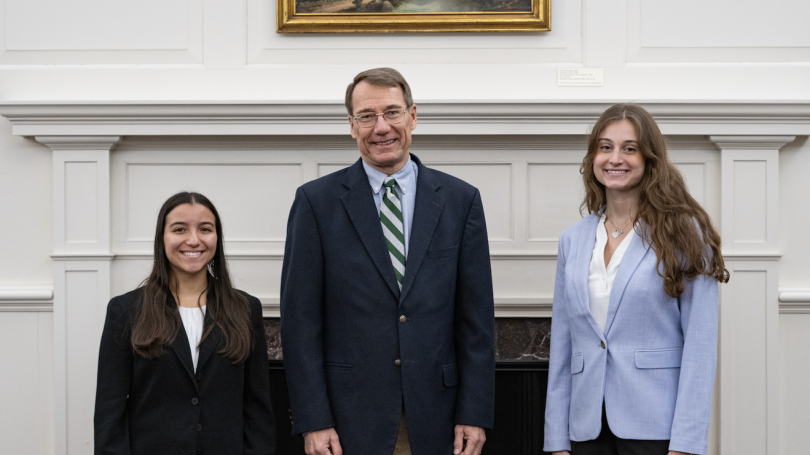
- Public Policy
- Leadership
- Funding
- News & Events
- About the Center
Back to Top Nav
Back to Top Nav
Back to Top Nav
Back to Top Nav
Below is an article, written by Claudia Shin about the Rockefeller Center Judicial Fellowship Program published by The Dartmouth. The original story can be found here. You can find more information about the Judicial Fellowship Program at the link here.
This fall, the Rockefeller Center for Public Policy formally launched the Judicial Fellowship Program — an off-term internship opportunity that pairs undergraduate students with alumni judges across the country. The program, which has been piloted informally since 2017, is open to all sophomores, juniors and seniors, according to Rockefeller Center associate director Herschel Nachlis.
The program is "unique" for undergraduates, as judicial internships are an experience often reserved for law school students, according to program coordinator Julie Kalish '91.
New Hampshire Supreme Court Justice James Bassett '78 was the first alumni judge to take on undergraduate interns, before the informal program spread to several other judges on the state Supreme Court, according to Bassett.
"It was initially relatively hard to convince my colleagues here at the Supreme Court that having an undergraduate intern would be valuable to the court … but quickly, we all came to see that the students brought a great deal of energy and initiative," Bassett said.
Bassett explained that his interns are included in meetings with law clerks, some of whom are recent law school graduates, which creates an atmosphere of "diverse and broad experience" in the court.
According to Kalish, the program is an "exceptional opportunity" for students interested in attending law school or pursuing a law-related career to explore what it is like to work in court. Kalish noted that the fellowship can help students "confirm" whether law school is a path they want to pursue.
While the program has been piloted with alumni judges and their colleagues, all judges involved will now be Dartmouth alumni, Nachlis said. The "scale" of the program is also growing — from just Bassett in 2017 to several judges across the country since the formal launch, according to Nachlis. Nachlis added that the program is the "brainchild" of Bassett, who had been "working to launch the program for [nearly] a decade."
Bassett said the program began with former action-based learning programs director Gail Gentes identifying students interested in court work and introducing them to him. Now, it has expanded to match undergraduate interns with four or five judges around the country, Bassett said.
"Dartmouth is really special in the extent to which alums have extremely warm feelings about the College, about current Dartmouth students and about their desire to support and mentor next generations," Kalish said. "We are just enormously fortunate to be able to have that kind of positive relationship with our alumni body."
Applicants can choose to apply for a winter, spring, summer or fall term fellowship, depending on when they choose to take their off-term, according to the program application. A committee at the Rockefeller Center reviews all submissions and selects up to three applications to share with each participating alumni judge, who then chooses their interns, according to Kalish.
Nachlis said he "encourages" students to apply regardless of their prior experience or academic background. The program is "open to everyone" — from "engineers and environmental scientists to economists and public policy political scientists" — because the law is a "full-range, generalist enterprise," he said.
"The judges are not looking only for a student who's only ever taken public policy or government classes because that's not what they want in lawyers or in law schools," Nachlis said. "You need to have strong writing analytic interests, because those are essential in the practice of law."
Nachlis also noted that the program encourages "dialogue in practice" — emphasizing the ideological "range" among participating alumni judges.
"One federal court in particular has two amazing Dartmouth alumni on it who ideologically could not have more different views and are both participating in this program," Nachlis said. "Ideally, we will have two Dartmouth students working with each of them on that court, having daily dialogues about these cases."
Carson Goh '25 said his experience as an intern for Bassett in winter 2023 "solidified" his interest in attending law school and pursuing a career in public interest law.
"I learned that public interest law, whether that be [a] prosecutor, defender or judge, is something that I [find] really fascinating," Goh said. "As an undergraduate, you don't really get to see or understand what [a judge's] day to day work is like, so being able to step in their shoes for a term was a really cool opportunity."